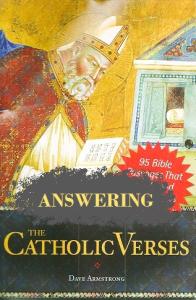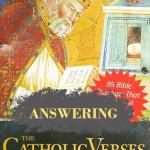[see book and purchase information for The Catholic Verses]
“excatholic4christ” (Tom) was raised Catholic, lost his faith in high school, attended Mass for a while after he married and had children, and then “accepted Jesus Christ” as his Savior, leading to his sole attendance at an independent fundamental Baptist church for eight years. He claims that the “legalism” of this church and the fact that his “trust had been in men rather than God” caused him to “walk away from the Lord for 23 years.” He “returned to the Lord” in 2014. As of April 2020, Tom stated that he was “somewhere in the middle of the Calvinism-Arminianism debate,” but “closer to Calvinism.” I couldn’t determine his denomination. See Tom’s index of all of his replies. I will systematically refute them. His words will be in blue. When he cites my words, they will be in black. I use RSV, unless otherwise specified.
*****
This is a reply to Tom’s article, The Authority of Sacred Tradition? – Part 2 (9-24-18).
Citing the four passages below, Armstrong argues for “the binding authority of tradition, according to St. Paul”:
1 Corinthians 11:2 “I commend you because you remember me in everything and maintain the traditions even as I have delivered them to you.”
1 Thessalonians 2:13 “And we also thank God constantly for this, that when you received the word of God which you heard from us, you accepted it not as the word of men but as what it really is, the word of God, which is at work in you believers.”
2 Thessalonians 2:15 “So then, brethren, stand firm and hold to the traditions which you were taught by us, either by word of mouth or by letter.”
2 Thessalonians 3:6 “Now we command you, brethren, in the name of our Lord Jesus Christ, that you keep away from any brother who is living in idleness and not in accord with the tradition that you received from us.”
Directly beneath the four verses, Armstrong writes, “Catholics believe that there is such a thing as a binding, authoritative Sacred Tradition and that it is explicitly indicated in the Bible (notably in the above passages). We believe that the Church is the guardian of this apostolic Tradition, passed down continuously through history from the Apostles.” – p. 38.
As you may recall, Armstrong has already made his case for the binding authority of oral tradition, so it’s a bit mystifying why he feels the need to tread the same ground once again.
It’s not the “same ground” since the first treatment dealt specifically with oral tradition. This one is about tradition in general (predominantly in written form).
An editor would have easily caught this redundancy.
It’s not redundant at all and I did have an editor, thank you: Todd Aglialoro, who has worked with me on five books.
Because I have already addressed Armstrong’s claims regarding oral tradition at length, I will keep my response to this second barrage somewhat brief.
He rarely produces any argument of substance, anyway, so no great loss there . . .
Regarding 1 Corinthians 11:2, in context we see that Paul is either referring to the Old Testament warnings to flee from idolatry as he expounded upon in chapter 10, or he may be referring to his exhortations that follow in chapter 11 regarding praying, authority, and head coverings.
It’s possible to interpret it as referring to particulars, perhaps those mentioned in context, but also possible to accept the verse (with the word παράδοσιν – parádosis) at face value, as a broad statement referring to sacred tradition in general. As I have noted before, St. Paul constantly refers to the apostolic deposit of faith or tradition in many ways, that are all synonymous or nearly so: “tradition, word of God, the faith, the truth, the commandment, the doctrine, teaching, the message, and (to a lesser extent because it’s more specific) the gospel: all “received” and “delivered” by him. In doing so, he obviously has in mind a concrete body of teachings that he taught the churches that he established. It’s not just one thing. If that were the case, he would have specified it. But he doesn’t do so in almost all cases of his use of the words above.
Thayer’s Greek Lexicon (Strong’s Greek word #3862) states that the same word means “a giving over which is done by word of mouth or in writing what is delivered . . . instruction . . . the substance of the teaching” in 2 Thessalonians 3:6 (one of my “Catholic verses” above), whereas he thinks it refers to “particular injunctions of Paul’s instruction” in 1 Corinthians 11:2 and 2 Thessalonians 2:15. He holds that the word can refer to “precepts received from the fathers, whether handed down in the O. T. books or orally” (Gal 1:14: “the traditions of my fathers”): with some restricting or including the reference in that passage to “extra-biblical traditions”.
In the Greek Septuagint (LXX) it’s used for “the law [of God]”: Ezra 7:26. Kittel’s Theological Dictionary of the New Testament (one-volume edition, p. 168, also, like Thayer, not a Catholic work, affirms that it refers to “written as well as unwritten traditions” in Galatians 1:14, and is equated with “Christian teaching” (1 Cor 11:2; 2 Thess 2:15); also deducing from 1 Corinthians 15:3 ff. and 11:23 ff., “that it is older than Paul and is already acquiring a fixed form in his day.” Any way we look at it, there is plenty of tradition in the sense that Catholics refer to it (including oral) in the New Testament.
Regarding 1 Thessalonians 2:13, the believers of the early church did not have the New Testament and depended on the direct teaching of Paul and the other apostles. As an apostle, Paul’s teaching authority was directly from the Lord Jesus Christ. But the things that Paul wrote in his epistle to the Thessalonians he had previously preached to them: “Do you not remember that while I was still with you, I was telling you these things?” – 2 Thessalonians 2:5.
Again, it was tradition, including oral tradition. Even Tom can’t help but bear witness to this, and he has no way of knowing all that it includes, but he is “sure” that it doesn’t refer to a wicked Catholic “mysterious black hole of ‘Sacred Tradition’” (i.e., any Catholic doctrines that he rejects).
Regarding 2 Thessalonians 2:15, in context we see that Paul is exhorting the believers to hold tightly to his teachings regarding the second coming of Christ, which he had just expounded upon in verses 1-12. Twisting this verse to prove Catholicism’s mysterious “Sacred Tradition” black hole is self-serving eisegesis.
Well, folks can and do have different interpretations of the word in that verse. As seen above, Thayer thinks it refers to “particular injunctions.” But Kittel (an even more respected linguistic source) holds that it is simply “Christian teaching”.
Regarding 2 Thessalonians 3:6, in context we see Paul is referring to the exhortation to work hard and not to be idle and is linked to his preceding warnings in chapter 2 regarding the lies of false teachers.
Again, equally honest and reasonable people (including non-Catholics) don’t necessarily agree with Tom’s take. Thayer in this instance thinks it is a general reference to instruction” and “teaching”. So his attempt to dogmatically squeeze every instance of parádosis into the box of particulars, but never referring to a general body of written and oral tradition passed down, just doesn’t fly. The linguists know what they are talking about. Tom does not.
Context is the key to proper Bible exegesis. As my old Baptist pastor often used to say, “Text without context is pretext.” Armstrong is guilty of manipulating verses out of context to say what they do not say.
I’m backed up by reputable Protestant linguistic sources. Tom is backed up by, well, nothing. Per his usual method, he simply spouts bare assertions without supporting scholarly references. And then — in his blissful, stupefied ignorance — he has to take the obligatory potshots at my supposed intellectual dishonesty.
He also implies that I think these passages prove any and every distinctive Catholic doctrine. I never made that claim. Rather, I am simply showing that there is a thing as “tradition” in the Bible, in a positive sense, and that it goes beyond the Bible and encompasses oral tradition, too. One thing at a time. I express exactly what it is I am seeking to prove, and I did so on page 38, and Tom even quoted it. I have accomplished my stated task and goal, and Tom hasn’t come within a million miles of refuting it.
*
*****
*
*
Summary: Anti-Catholic Tom is over his head in grappling with the NT concept of tradition (parádosis). I cite two reputable Protestant linguistic works against him.














